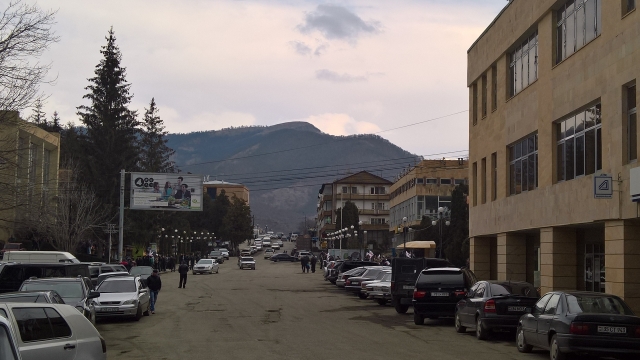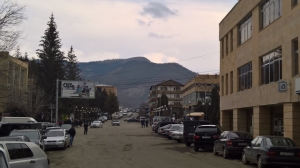The Armenian National Commission for UNESCO Visits Dilijan
Dilijan, Armenia – 21 March 2017. On the 18th of March, at the invitation of the Dilijan Municipality and the Dilijan Community Center, the representatives of the Armenian National Commission for UNESCO visited Dilijan, which has joined the UNESCO Global Network of Learning Cities (GNLC) in 2016.
A round table was held at the Dilijan Municipality, where UNESCO’s activity and programmes were presented. The Deputy Minister of Foreign Affairs of Armenia Mr. Ashot Hovakimyan, the Deputy Governor of the Tavush province Mr. Levon Sarkisyan, the Secretary General of the Armenian National Commission for UNESCO Amb. Vahram Kazhoyan, the Deputy Mayor of Dilijan Mr. Armen Makaryan, representatives of the cities of Armenia which have joined the GNLC and directors of Dilijan's educational institutions were among the participants of the meeting.
"The municipality was happy to support the initiative of the Dilijan Community Center to join UNESCO's Global Network of Learning Cities," said Vice Mayor of Dilijan Armen Makaryan, opening the discussion. “There are 36 educational establishments in Dilijan that has a population of 27 thousand, and the emergence in recent years in Dilijan of such international educational centres as the UWC Dilijan, the Research and Training Centre of the Central Bank of Armenia, the American University of Armenia, the AYB School, the TUMO Centre for Creative Technologies and the Dilijan Community Center has stimulated the desire in the city for lifelong learning."
In his speech, the Deputy Minister of Foreign Affairs of Armenia, Ashot Hovakimyan, described the cooperation of Armenia with and within international organizations and in particular that with UNESCO.
"In Armenia, six cities have joined the UNESCO Global Network of Learning Cities – Sevan, Sisian, Dilijan, Gyumri, Abovyan and Echmiatsin", said Mr. Hovakimyan and called on other Armenian cities to apply for membership to the UNESCO Global Network of Learning Cities and engage in close collaboration with the Armenian National Commission for UNESCO.
Secretary General of the Armenian National Commission for UNESCO Amb. Vahram Kazhoyan presented the UNESCO programmes in Armenia. He noted that joining the GNLC proves that the city is committed to the development of education and the promotion of lifelong learning for all. While joining the GNLC provides neither status/designation nor financial rewards, it does provide an opportunity to share experience, knowledge and approaches to solving problems at the international level and promotes the city through educational channels. Mr. Kazhoyan urged the cities to apply for the upcoming cycles of the Learning Cities Award. He also presented another one of UNESCO’s initiatives- the UNESCO Creative Cities Network.
In concluding the discussion, the Programme Director of the Dilijan Community Center Rubina Ter-Martirosyan proposed creating a platform for the exchange of experience between the cities of Armenia and members of the GNLC, with a view to further discuss common problems at a higher, international level. The idea was supported by the Armenian National Commission for UNESCO.
As part of the visit to Dilijan, the delegation visited the Dilijan Community Center and the UWC Dilijan.
***
About the Global Network of Learning Cities (GNLC)
UNESCO established the Global Network of Learning Cities (GNLC) to encourage the growth of learning cities, accelerating the practice of lifelong learning in the world’s metropolitan areas.The GNLC global network mobilizes cities while demonstrating how a city’s resources can be used most effectively to provide learning opportunities to its citizens to “enrich human potential, promote equality and social justice, encourage economic growth, and maintain social cohesion in order to create sustainable prosperity”.GNLC is intended to help cities create a better future for their citizens as well as the planet, by transforming themselves into learning cities.
About the Dilijan Community Center
The Dilijan Community Center, which was founded with the support of the Scholae Mundi Armenia Foundation, sees its mission as helping to shape a caring community (both indigenous people and newcomers), ready to unite their efforts to change the prevailing reality.
The educational unit consists of courses in Russian and English, choir singing, dance and theatre studios, training in developing and managing social projects, open lectures, teaching the fundamentals of SME management for women, an internet radio station and a Spanish language club.
The Community Center project programme includes courses for teachers on informal education, social entrepreneurship and master classes for furniture redesign, as well as the creation and operation of local media and a children's Café#2.
About the Scholae Mundi Armenia Foundation
Scholae Mundi Armenia Foundation is one of the three Charity Foundations (Scholae Mundi Armenia, Scholae Mundi Russiaand Scholae Mundi UK) that compound the Scholae Mundi Platform established by entrepreneurs and philanthropists Ruben Vardanyan and Veronika Zonabend.
The mission of Scholae Mundi Armenia Foundation is to diversify the educational scene in Armenia by supporting the socially-oriented innovative projects and initiatives in the areas of education, arts and culture, to promote Armenia internationally and to strengthen the positive impact on the communities locally in Armenia and globally. Its current projects include development of the scholarship program to support further education of the UWC graduates in Armenia and abroad as well as to make it possible for Armenian talented youth to participate in the programs of the Scholae Mundi Platform. The Foundation is also aimed at an establishment of an Educational Cluster in Dilijan that would unite the leading educational institutions in the region and develop the strongest synergy among them for the benefit of all the participants.
Scholae Mundi Platform promotes, on a non-for profit basis, the most advanced educational practices for the public benefit, while catalyzing wider social change, it supports education of students at UWC Dilijan College and other educational establishments by providing funds for capital development and scholarships. The major focus of the Platform now includes expansion of the partners’ network in the fields of education, research, training, and development in launching new internationally-recognized educational platforms, programs, and initiatives.
Further information is available at www.scholae-mundi.org











